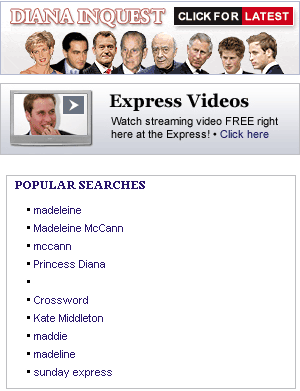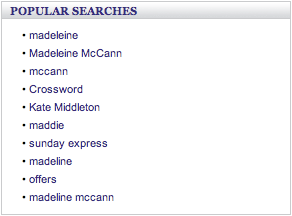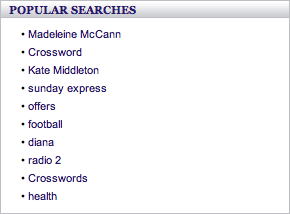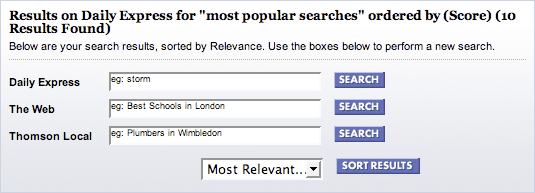At last, some varied 'popular' search terms on the Express site
It seems I got a bit over-excited earlier this week when I wrote about the Daily Express changing two of the most popular search they list on their search results page. That appears in fact to have just been the first step towards providing a broader spread of search terms on the page.
For nearly three months, the site had displayed the same set of ten search terms - including one blank one - as the most popular on the site.

The first set of changes replaced Princess Diana on the list with yet another variation on searches about the Madeleine McCann case.

The following day I got another one of my 'VROOT! VROOT!' alert emails to let me know that the site had made even more changes. Diana was back, alongside some more navigational types of query like 'health' and 'football'.
- Madeleine McCann
- Crossword
- Kate Middleton
- sunday express
- offers
- football
- diana
- radio 2
- Crosswords
- health

Altogether it looks a much more likely set of popular search terms, rather than the McCann obsession that was previously on display. Even more importantly, these links actually go through to useful searches that generate results, unlike the searches for Madeleine which produced few useful results once the Express story archive had been purged.
Another change has been in the way that the Express suggests people use their search engine. 'Princess Diana' is no longer the suggested search term, being replaced with another common theme likely to appear on the Express front page - the British weather.

This has subsequently been changed to 'eg: sunday express magazine'
Useful and graceful search URLs
One thing I should say in praise of the search implementation on the Express site is that I like the way that they construct the URLs for their search results.
Regardless of the dynamic systems producing the results behind-the-scenes, the Express returns search URLs that are human readable and human guessable. They simply take the format http://www.dailyexpress.co.uk/search/keyword.
This is a good architecture principle to follow, making URLs as simple and as easy for users to understand as possible, and making them persistent regardless of the underlying technology.